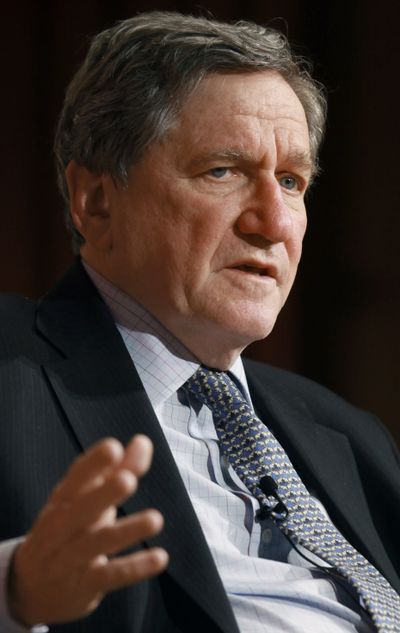‘One of a kind’ diplomat Holbrooke dies

WASHINGTON – Richard C. Holbrooke, the hard-charging diplomat who brokered peace in the Balkans and then took on an even tougher task as the Obama administration’s special envoy for Afghanistan and Pakistan, died Monday night at age 69.
Holbrooke, whose career spanned nearly five decades, was a forceful presence in U.S. foreign policy whether in or out of office. He negotiated the 1995 Dayton Accords, which ended the war in Bosnia; served as ambassador to the United Nations and to Germany; and mentored a younger generation of American diplomats.
His death, from heart problems that sent him to the hospital Friday, is a heavy blow to President Barack Obama’s foreign policy team, and particularly the president’s hopes of stabilizing Afghanistan, where nearly 100,000 U.S. troops are deployed.
Later this week, Obama is expected to announce the results of a review of U.S. policy in Afghanistan one year after he ordered 30,000 additional troops to the country and a change in American strategy.
“He was one of a kind – a true statesman – and that makes his passing all the more painful,” Secretary of State Hillary Rodham Clinton said in a prepared statement Monday evening. She praised Holbrooke’s “distinctive brilliance and unmatched determination.”
Holbrooke was known to legions of foreign diplomats, world leaders and journalists as a forceful figure on the world stage, who did not brook fools lightly, had a supreme confidence in his own abilities, and had a reputation as a fearsome negotiator.
He was tapped days after Obama took office in 2009 to be the president’s special representative for Afghanistan and Pakistan and oversee the civilian side of Obama’s policy in the region.
He assembled a large team at the State Department and oversaw a surge of U.S. civilian specialists into Afghanistan while helping reorient U.S. policy away from a fixation on drug eradication and advocating modest, achievable U.S. goals in the war-torn country.
Holbrooke fell ill Friday during a meeting at the State Department with Clinton and was taken to George Washington University Hospital, where doctors diagnosed a torn aorta. He underwent more than 20 hours of surgery over the weekend.
Sen. John Kerry, D-Mass., chairman of the Senate Foreign Relations Committee, said in a prepared statement: “This awful news is almost incomprehensible, not least of all because I cannot imagine Richard Holbrooke in anything but a state of perpetual motion. … He died giving everything he had to one last difficult mission for the country he loved.”
Holbrooke will probably be best remembered for the Dayton Accords, which ended the three-year war in Bosnia with a power-sharing deal that he negotiated among bitter enemies: the Serb, Croat and Bosnian Muslim leaders. While Bosnia remains very much a divided country, the deal has prevented the resumption of war for 15 years.
His impact in the very different arena of Afghanistan remains to be seen. Holbrooke reportedly never developed a close relationship with Obama, and he clashed frequently with Afghan’s mercurial president, Hamid Karzai, hampering his effectiveness.
Earlier Monday, before Holbrooke died, the State Department said his role would be filled in the interim by his deputy, Frank Ruggiero, a foreign service officer.
Retired ambassador Christopher R. Hill, who was one of Holbrooke’s deputies during the Dayton process, said the late diplomat “made a lot of careers, including mine.”
During the negotiations over Bosnia’s future, Hill said, Holbrooke was equally in command of diplomatically vital administrative details and the big picture of the negotiations. “You just saw the full sweep of his strategic concept, right down to logistics.”
As seen in his Afghanistan-Pakistan assignment, Holbrooke “never shied away from the tough issues. Went right at them,” said Hill, who served as U.S. point man on North Korea and later ambassador to Iraq. He is now dean of the University of Denver’s Joseph Korbel School of International Studies.
While Holbrooke had a reputation for being brusque, Hill said he was invariably generous about sharing credit with his team – a rare trait among top officials in Washington. “Those of us who worked with him, he always gave us a lot of credit, shared the limelight,” Hill said.